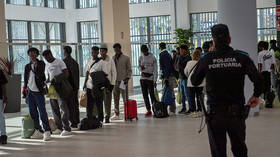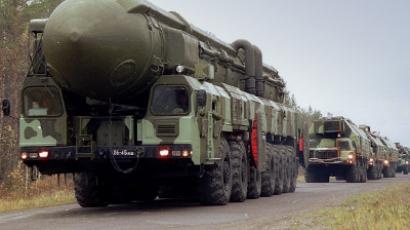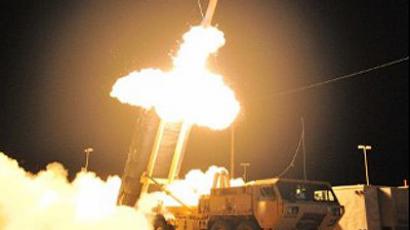Medvedev outlines measures to counter Western missile defense
President Dmitry Medvedev says that Russia will no longer wait to join the European missile defense system, but rather take defensive and offensive initiatives to protect its citizens and preserve its sovereignty.
"Citizens of Russia, My address concerns the situation we have in Europe regarding NATO’s missile defense. Let me briefly review it. We are in a rather complex situation with the United States and NATO over missile defense. I recall how we welcomed the move when in September 2009 the US President revised his predecessor’s plans to deploy a missile shield in Europe. That was a smart decision, and it helped sign an important treaty reducing and limiting strategic offensive weapons. This treaty clearly says that strategic arms and missile defense are closely interrelated. I repeat, this treaty was a big step forward. However, later the United States began to implement its new missile defense plan, the so-called phased approach. It is this approach that causes us concern. The problem is, it means that in the future, interceptor missiles and other missile defense elements may be deployed close to the Russian borders and in adjacent seas. At the Russia-NATO summit in Lisbon a year ago, I suggested creating a joint missile defense system in Europe. We suggested that if we have to develop missile defense, it is better to do it together. We suggested making this system sector-based, with each party responsible for the corresponding sector. Moreover, we said we were open to suggestions from our NATO partners and could make necessary adjustments to this layout, as long as its key elements remain intact. And the key element is that Europe does not need new dividing lines. It needs a common security perimeter, with Russia participating in it as an equal partner. I am still convinced that such an approach would offer unique opportunities for Russia and NATO to develop a real strategic partnership, because friction and confrontation in our relations can be replaced with the principles of equality, indivisible security, mutual trust and predictability. Unfortunately, the United States, and later other NATO members, failed to demonstrate serious readiness to take this way. They are not going to take account of our concerns regarding the architecture of the European missile defense system. At least they are not doing it today. They merely tell us that their plans are not aimed against Russia. All they say is, “This is not aimed against you, don’t worry.” They say there is no reason for us to be concerned. But this comes from the executive branch only, whereas lawmakers in some countries tell us openly, “This is intended against you.” And when we ask them to put it on paper and give us clear, unequivocal legal guarantees, they give us a firm no. Our position is reasonable. We are ready to discuss the status and contents of these guarantees, but our partners should realize that these guarantees cannot be general and abstract. They need to be formulated in such a way that Russia can rely not on promises, but on objective military data to determine whether the steps the United States and NATO take in developing missile defense are in line with their declarations, or whether they are infringing our interests and undermining the strategic nuclear parity, which is the foundation of global security today. We will not participate in a program that may negatively affect our deterrent potential in a rather short time – in five, six, perhaps eight years. The European missile defense program is currently being implemented, and unfortunately, it is being done at a fast pace. It is happening in Poland, Turkey, Romania, Spain. Russia is presented with a fait accompli. Of course, we’ll continue our dialogue on missile defense with the United States and NATO, as we have agreed with US President Barack Obama during our recent meeting, where I once again had to tell him clearly about our concerns. We still have time to come to an agreement. And Russia has political will to reach an agreement that would open a fundamentally new chapter in our relations with the United States and NATO. If our counterparts act fairly and responsibly and take our legitimate security interests into account, I am convinced that we will be able to come to an agreement. But if they want us to cooperate (or, let’s face it, simply work) to the detriment of our own interest, we won’t be able to find common ground. And then we will have to respond differently. Our actions will depend on the actual developments, as the US plan is implemented stage by stage. Because of that, I have taken the following decisions: First, I have instructed the Defense Ministry to immediately activate an early warning radar in Kaliningrad. Second, as part of the Russian aerospace defense program, Russia will urgently strengthen its defensive capabilities for Strategic Nuclear Forces installations. Third, strategic ballistic missiles coming into the arsenals of Russia's Strategic Missile Forces and the Navy will be fitted with advanced missile defense penetration systems and the latest effective warheads. Fourth, I have ordered the Armed Forces to develop a set of measures that will enable Russia, if necessary, to destroy the data exchange and control centers of the missile defense system. These measures are adequate, effective and cost-efficient. Fifth, if the aforementioned measures prove to be insufficient, the Russian Federation will deploy, along its western and southern borders, advanced offensive systems capable of destroying the European component of the missile defense system. This will include deploying Iskander missiles in Kaliningrad. Other measures aimed at neutralizing the European component of the US missile defense system will also be prepared and implemented if necessary. Next, if problems persist, Russia reserves the right to refrain from taking further steps as regards disarmament and arms control. Furthermore, considering that strategic offensive and defensive weapons are closely interrelated, Russia may have sufficient grounds to withdraw from the New START Treaty. Such a possibility is envisaged in the very idea of this treaty. Nevertheless, I would like to stress once again that the door for further dialogue on missile defense with the United States and NATO and for practical cooperation in this area remains open. We are ready for that. However, before we start working, we need a clear legal framework for our cooperation. This framework should take account of our legitimate interests. We are open to dialogue, and we expect our Western partners to take a reasonable and constructive approach."













